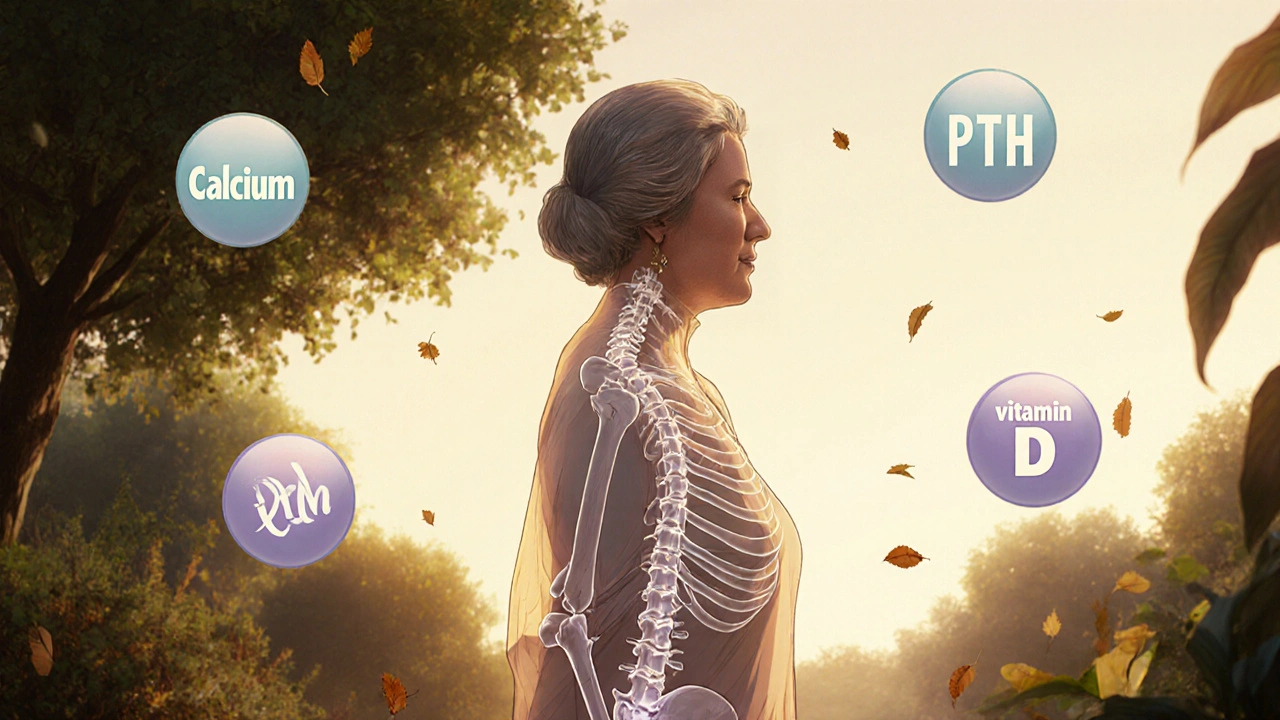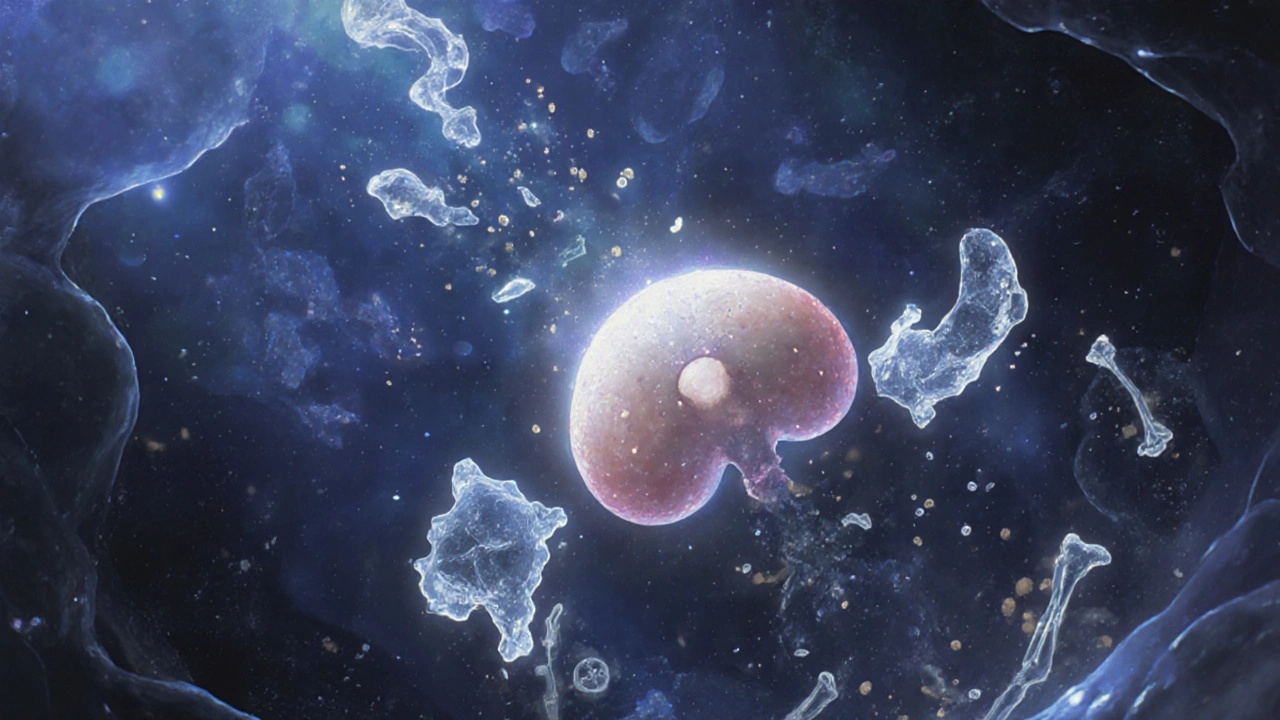When you think about bone health, you probably think of calcium, vitamin D, or weightlifting. But there’s another player working quietly behind the scenes-calcitonin. This hormone doesn’t get much attention, but without it, your bones would be far more vulnerable to breakdown. Calcitonin is a real-time regulator of calcium levels in your blood, and it plays a direct role in keeping your skeleton strong and stable.
What Is Calcitonin and Where Does It Come From?
Calcitonin is a hormone produced by the parafollicular cells, also called C-cells, of the thyroid gland. These are small clusters of cells nestled between the main thyroid follicles. While most people know the thyroid for making T3 and T4-hormones that control metabolism-few realize it also makes calcitonin. This hormone is released when blood calcium levels rise too high, acting like a brake pedal to stop calcium from spiking.
Calcitonin’s main job is to lower blood calcium. It does this in two ways: first, by telling bone cells called osteoclasts to slow down. Osteoclasts are the cells that break down bone tissue and release calcium into the bloodstream. When calcitonin signals them to rest, less calcium is pulled from your bones. Second, calcitonin helps your kidneys flush out extra calcium through urine. This dual action keeps calcium in balance.
Unlike other hormones that work over days or weeks, calcitonin acts fast. Within minutes of a calcium spike, it kicks in. That’s why it’s so important after meals high in calcium or during bone remodeling phases.
How Calcitonin Protects Your Bones
Your bones aren’t just rigid structures-they’re living, changing tissues. Every day, old bone is broken down and new bone is built. This process, called remodeling, is a tight dance between osteoclasts (breakdown) and osteoblasts (building). Calcitonin tips the balance toward building by suppressing osteoclast activity.
Think of it like a traffic controller. If osteoclasts are cars speeding through a construction zone, calcitonin is the stoplight that slows them down. This gives osteoblasts time to lay down new bone matrix. Without this control, bone loss can outpace rebuilding. That’s one reason why calcitonin is linked to lower fracture risk in older adults.
Studies show that calcitonin reduces vertebral fractures by about 30% in people with osteoporosis. While it’s not the first-line treatment today, it still has a role-especially for patients who can’t tolerate bisphosphonates or need short-term relief from bone pain due to fractures.
Calcitonin vs. Other Bone Hormones
Calcitonin doesn’t work alone. It’s part of a trio of key players that manage calcium and bone health: parathyroid hormone (PTH), vitamin D, and calcitonin itself.
PTH does the opposite of calcitonin. When calcium drops, PTH tells bones to release calcium, tells the kidneys to hold onto calcium, and activates vitamin D to pull more calcium from food. Calcitonin steps in when PTH has gone too far. It’s the balancing force.
Vitamin D helps absorb calcium from your gut and keeps it in your blood. But without calcitonin to prevent excessive bone breakdown, that calcium could end up being pulled from your skeleton instead of being used to build it.
Here’s how they compare:
| Hormone | Source | Primary Action | Effect on Bone |
|---|---|---|---|
| Calcitonin | Thyroid C-cells | Lowers blood calcium | Reduces bone breakdown |
| Parathyroid Hormone (PTH) | Parathyroid glands | Raises blood calcium | Increases bone breakdown |
| Vitamin D | Skin (with sunlight), liver, kidneys | Boosts calcium absorption | Supports bone formation |
Calcitonin is the only one of the three that directly inhibits bone resorption. That’s why it’s unique-and why researchers still study it for targeted therapies.

When Is Calcitonin Used as a Treatment?
Although calcitonin is naturally produced in the body, synthetic versions are available as nasal sprays or injections. These are used medically in specific cases:
- Postmenopausal osteoporosis in women who can’t take other medications
- Acute bone pain from vertebral fractures
- Hypercalcemia (dangerously high calcium levels), especially from cancer or kidney disease
- Paget’s disease of bone, a condition where bone remodeling goes haywire
It’s not a daily supplement you take like vitamin D. It’s a prescription drug with a narrow window of use. Most doctors don’t start with calcitonin anymore because newer drugs like denosumab and teriparatide are more effective at building bone long-term. But for some patients-especially those with kidney issues or allergies to other drugs-calcitonin remains a safe, low-risk option.
One downside: its effects fade over time. The body can become less responsive to it after a few months, which is why it’s often used short-term or as a bridge to other treatments.
Can You Boost Calcitonin Naturally?
There’s no proven way to increase your body’s natural calcitonin production through diet or supplements. Unlike vitamin D, which your skin makes in sunlight, calcitonin isn’t influenced by food, herbs, or lifestyle changes.
But you can support its function. Since calcitonin works best when calcium levels are stable, keeping your calcium intake consistent helps. Aim for 1,000-1,200 mg per day from food: dairy, leafy greens, fortified plant milks, sardines, and almonds. Too little calcium makes your body pull from bones; too much can trigger unnecessary calcitonin spikes.
Also, avoid excessive salt and caffeine. Both increase calcium loss through urine, forcing calcitonin to work harder. And don’t ignore vitamin K2-it helps direct calcium into bones instead of arteries, reducing the burden on your hormonal system.

Who Should Be Aware of Calcitonin Levels?
Most healthy people don’t need to test their calcitonin levels. But certain groups should pay attention:
- People with medullary thyroid cancer-this rare cancer starts in the C-cells and often causes abnormally high calcitonin levels
- Those with unexplained high calcium levels, especially if no cause is found
- Patients with Paget’s disease or severe osteoporosis not responding to standard treatment
- Individuals with a family history of multiple endocrine neoplasia type 2 (MEN2), a genetic disorder linked to thyroid tumors
If you have one of these conditions, your doctor might order a calcitonin blood test. Normal levels are under 10 pg/mL for men and under 5 pg/mL for women. Levels above that can signal early cancer, even before a tumor is visible on scans.
Why Calcitonin Still Matters Today
Even though newer drugs dominate osteoporosis treatment, calcitonin hasn’t disappeared. It’s a reminder that bone health isn’t just about adding more calcium or exercising harder. It’s about fine-tuning the body’s internal systems.
Calcitonin shows us that bones aren’t static-they’re dynamic organs that respond to hormonal signals every second of the day. When you understand how calcitonin works, you see why balance matters more than quantity. Too much of one thing (like calcium or PTH) can be just as harmful as too little.
For anyone concerned about aging bones, understanding calcitonin adds depth to the conversation. It’s not about chasing quick fixes. It’s about supporting your body’s own mechanisms-through smart nutrition, avoiding bone-robbing habits, and knowing when medical help is needed.
Is calcitonin the same as thyroid hormone?
No. Calcitonin is made by the thyroid, but it’s not the same as T3 or T4. Those hormones regulate metabolism, energy, and heart rate. Calcitonin only affects calcium and bone. You can have normal thyroid function but still have low calcitonin, and vice versa.
Can calcitonin help with joint pain?
Not directly. Calcitonin targets bone, not joints. But if joint pain is caused by bone fractures or bone disease like Paget’s, calcitonin can reduce the underlying bone pain by slowing bone breakdown. It won’t help with arthritis or tendon issues.
Is calcitonin safe for long-term use?
It’s not recommended for long-term use. After 6-12 months, the body often becomes resistant to its effects. Also, some studies suggest a small increased risk of cancer with prolonged use, though the evidence isn’t strong. Doctors usually prescribe it for short periods or as a bridge to stronger therapies.
Do I need to take calcitonin if I have osteoporosis?
Not usually. First-line treatments like bisphosphonates, denosumab, or teriparatide are more effective at building bone. Calcitonin is an alternative if you can’t tolerate those drugs, have kidney problems, or need quick pain relief from a recent fracture.
Can low calcitonin cause osteoporosis?
Not directly. Most people with osteoporosis have normal calcitonin levels. The problem is usually that other systems-like PTH or estrogen-are out of balance. Calcitonin is a helper, not the main driver. Low levels alone don’t cause bone loss, but losing its protective effect can make things worse.
What to Do Next
If you’re worried about bone health, don’t focus only on calcium pills. Look at the whole system. Eat balanced meals with enough protein and vitamin K2. Avoid smoking and excessive alcohol. Get regular weight-bearing exercise. And if you’ve had a fracture after age 50, ask your doctor about a bone density test and whether calcitonin or another therapy could help.
Calcitonin may not be flashy, but it’s one of the body’s quiet guardians of bone. Understanding it gives you a deeper, smarter way to protect your skeleton-not just for now, but for life.

Ancel Fortuin
So calcitonin is just nature's way of saying ' chill out with the calcium ' lol. Meanwhile in Nigeria, we just drink milk and pray. 🤷♂️
Hannah Blower
Let’s be real-this whole calcitonin thing is just a glorified band-aid for a broken system. We’re treating symptoms while ignoring the root: industrial food, sedentary lifestyles, and the pharmaceutical industry’s need to sell something. You don’t need a hormone spray-you need to stop eating processed junk and start lifting heavy things. 🧠💀
Gregory Gonzalez
I mean, sure, calcitonin is cute and all, but if you’re relying on a hormone that fades after six months to fix your bones, you’re basically using duct tape to hold together a Tesla. 🚗🔧
Timothy Uchechukwu
Why are we even talking about this when Africa has real bone health crises like malnutrition and lack of clean water? This is elite biohacking nonsense for people who have too much time and too much money. We need food security, not nasal sprays. 🇳🇬
Ronald Stenger
The fact that this article even mentions calcitonin as a 'treatment' is a red flag. Big Pharma loves these niche drugs because they’re easy to patent and hard to test properly. Meanwhile, the real solution? Vitamin K2, magnesium, and sunlight. But hey, why sell a $300 spray when you can sell a $2 supplement?
Samkelo Bodwana
I think we’re all missing the bigger picture here. Bone health isn’t just about hormones or supplements-it’s about community, movement, and connection to the earth. My grandfather in rural ZA didn’t know what calcitonin was, but he walked 10km every day, ate whole foods, and never had a fracture. Maybe the answer isn’t more science, but less disconnect from how humans were meant to live. 🌍🙏
Emily Entwistle
So calcitonin is like the quiet roommate who cleans up after everyone else’s mess? 😊 I love it! 🌿骨头守护神!✨
Duncan Prowel
The physiological mechanism described is indeed accurate, though the clinical relevance of exogenous calcitonin remains highly contested in contemporary endocrinology. The cited reduction in vertebral fractures, while statistically significant in some cohorts, lacks robust long-term efficacy data when compared with RANKL inhibitors. One must also consider the pharmacokinetic limitations of nasal administration and the potential for tachyphylaxis. The assertion that it is 'a quiet guardian' is poetic, yet scientifically imprecise.
Jonathan Gabriel
wait so calcitonin is like the bouncer at the calcium club? kicks out the overeager osteoclasts? 🤔 i mean that’s kinda beautiful… but also… why isn’t this in every bio 101 textbook? why do we only hear about vitamin d and calcium? this is the real MVP. also… anyone else notice how the body’s systems are just… elegant? like a symphony of tiny cells whispering to each other? i’m crying. 🥹
Bruce Bain
So if you got weak bones, just eat more milk, walk more, and don’t drink soda. No spray needed. Simple. 🤝